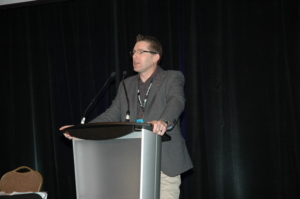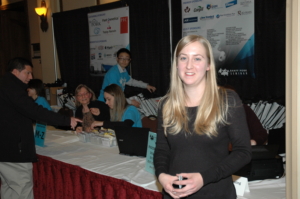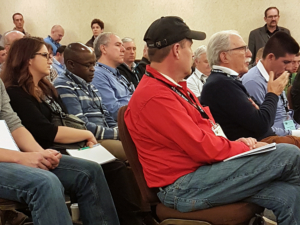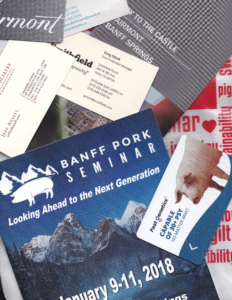Even the most stoic of university professors could not help but crack a smile. A really big smile.
As he opened the 2018 Banff Pork Seminar, committee chair Mark Chambers announced that, for the first time in its 47-year history, the event had completely sold out with more than 750 people registered.
completely sold out with more than 750 people registered.
The next afternoon, program co-chair Ruurd Zijlstra – a dedicated research scientist not known for an overly bubbly demeanour – announced with a broad smile that walk-ins had brought the total number of registrants to 770.
“You showed up in droves this year. We’re very pleased by that final number. I have to say, it didn’t feel that crowded to me,” said Zijlstra, Chair of Agricultural Life and Environmental Sciences at the University of Alberta.
“It was very nice and, of course many of you used that opportunity, with that many people, to use our meeting as a networking meeting as well. That’s one of the goals that we have as a meeting. We want to have an excellent program, but we also want to provide you with enough networking opportunities.”
 Outside the meeting, program co-ordinator Ashley Steeple, now in her third year helping organize the seminar, said there appeared to have been two factors working in its favour this year. The pork industry had been relatively stable in the weeks leading up to the seminar and the venue itself – the fabled Fairmont Banff Springs Hotel in the heart of Banff National Park – has proven to be a big draw.
Outside the meeting, program co-ordinator Ashley Steeple, now in her third year helping organize the seminar, said there appeared to have been two factors working in its favour this year. The pork industry had been relatively stable in the weeks leading up to the seminar and the venue itself – the fabled Fairmont Banff Springs Hotel in the heart of Banff National Park – has proven to be a big draw.
“We thought it might be a strong year. It’s the kind of increase we’ve seen since we’ve moved back to the Fairmont (Banff) Springs, with people coming and networking for the whole week,” she said.
While earlier seminars had been hosted at the hotel, it was moved after a few years to the Banff Centre because of space issues. The hotel subsequently built a new convention centre and made an aggressive bid to bring the conference back for 2016, after the Banff Centre contract expired.
A new contract has now been signed, assuring delegates that they will have at least three more years at the Banff Springs.
Alberta-born Greg Meek, sow production manager for Smithfield Foods in Yuma, Col., was among the delegates looking forward to coming back for more.
“Acme area is where we originally farmed – we had a hog and grain farm, 275-sow operation,” said Meek.
That’s a radical change from where he is now, overseeing several sow farms.
Meek said he started with Smithfield’s operation in Utah, then helped with a start-up in Romania for three years before transferring to Colorado, where he and his family have stayed for the past eight or nine years.
“Generally, my day will start in one of the farms. From about seven in the morning until about 1:30, I’ll work in the farms with one of the teams, do trainings, support managers.”
 He dedicates the rest of his day to working in his office, with data from the farms.
He dedicates the rest of his day to working in his office, with data from the farms.
Meek said he cannot overstate the value of tracking data in managing each barn and the need to keep staff mindful of that value.
“In some cases it’s challenging. But, for the most part, my managers are all wanting to be successful, wanting to move ahead and they generally listen and implement fairly quickly.” Meek said he came to Banff Pork to learn.
“You always want to get outside perspective. You can kind of get stuck in a box: This is our company, this is how we do things. It’s nice to get outside perspectives and to network with people outside of your own company and learn new things.”
Interviewed midway through the first day, Meek said the sessions that was of most interest to him was on fixed timing of artificial insemination, conducted by Prof. Michael Dyck, program co-chair with Zijlstra of the Banff Pork Seminar. “We’ve gone to PCAI (post-cervical AI) already in our herds. Meek said PCAI was adopted to save labour and to maximize use of their best boars in Smithfield’s breeding herds. While he hasn’t attended every seminar, Meek said he was there for the first edition, a few years after his dad purchased his sow herd. Much has changed in the 15 years since he last attended Banff Pork, especially the growth in the number of delegates.
Looking to the future, he said he is confident that trade negotiations now under attack by the leadership of the United States will fall nicely into place. “If they don’t, we’ll adjust.”
The 2018 Banff Pork Seminar was built around a theme of “looking ahead to a next generation,” said Chambers, who has now completed his five-year term with the committee.
He commented at opening about the massive changes the industry has seen since a handful of delegates gathered for the first Banff Pork Seminar, held in a conference room at Olds College.
Production has become more efficient, pigs are heavier and sow production has risen from 18 to 30 pigs per year.
There are new challenges, including protecting domestic herds from foreign disease and maintaining public trust in animal agriculture.
In his closing remarks, Zijlstra advised delegates to watch for a callout for new people to sit on the committee to replace those whose terms have now  expired. He also encouraged delegates to fill out evaluation forms, citing the session by Greg Peterson as one of the great suggestions that came out of evaluation forms from a previous seminar.
expired. He also encouraged delegates to fill out evaluation forms, citing the session by Greg Peterson as one of the great suggestions that came out of evaluation forms from a previous seminar.
Banff Pork Seminar is a project of the University of Alberta, Alberta Pork and Alberta Agriculture and Forestry, with financial support from a broad spectrum of industry partners.
Zijlstra asked that people think about coming back for the next session, set for Jan. 8-10, 2019. •
— By Brenda Kossowan




